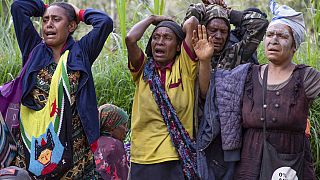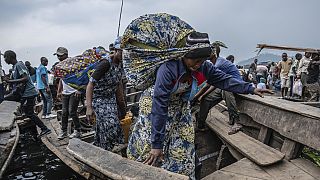Republic of the Congo
Smoking chimneys, lead-laden dust and pungent smells - the residents of this factory in the heart of a working-class neighborhood seem to have become accustomed to this toxic cocktail to which they have been exposed for several years.
Yet here are men, women and children whose examinations have revealed alarming levels of lead in their blood, making their health more fragile by the day.
“This factory makes life difficult for us. When they blow the smoke, our stomachs hurt, my child and I are contaminated with lead," one resident complained.
The company's name is Metssa Congo, and the Congolese-registered Indian company is one of the world's leading recyclers of used batteries and lead, one of the most dangerous metals on the planet.
Cyrille Ndembi, together with his neighbors, is leading a legal battle against the company, to obtain the closure and relocation of the factory.
He and his family have been suffering from chronic pneumonia since they arrived in the neighborhood in 2019.
“We consulted a laboratory, which took samples, the analyses were carried out in France at the CERBA laboratory and it turned out that we were intoxicated with lead. And that's on a sample of 26 people. As we speak, the administrative summary judgment judge has ordered the temporary suspension of the plant's activities, pending a ruling on the merits. But as long as they continue to work we remain exposed and continue to inhale these toxic gases that are making us sicker and sicker,” said Cyrille.
“Indeed, the blood lead levels we found were significant enough for there to be no scientific doubt that it did come from this plant, because of the radio concentration, i.e., those closest to the plant had the highest levels,” said Fréderic Mavoungou, a pharmacist and a biologist.
In response to these accusations, Arun Goswami, head of the METSSA Group defended the company saying that METSSA operated in strict compliance with international industrial standards.
As lead poisoning has only been proven in a sample of the population, it is now up to the court to decide whether the factory is the cause of the poisoning. In the meantime, other cases may come to light.











Go to video
Lassa fever kills 118 in Nigeria since the start of the year
Go to video
World Bank: effective policy measures could halve air pollution by 2040
02:02
New report finds only seven countries met world clean air standards in 2024
05:56
DRC: Malaria cited as cause of deaths, and infections in Equateur province
Go to video
DRC mysterious illness outbreak: 419 cases and 53 deaths reported
01:47
How a Cameroonian stove turned recycled oil into clean fuel